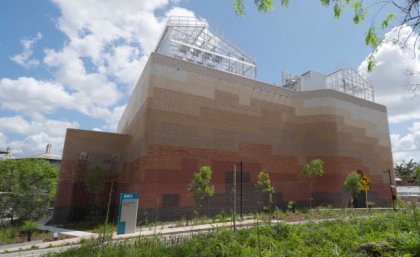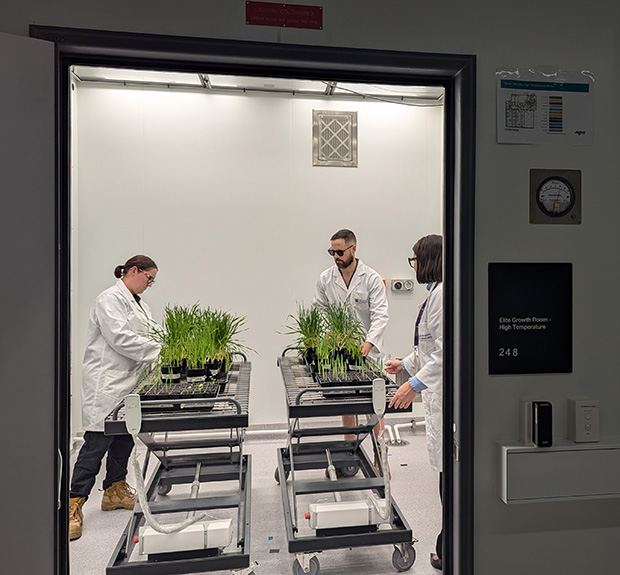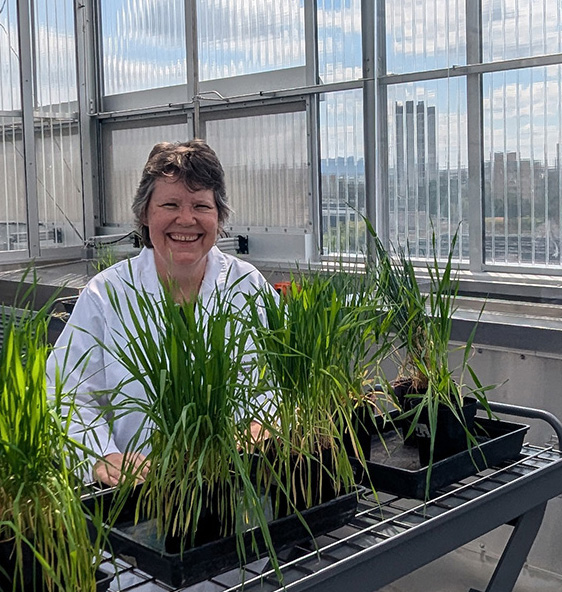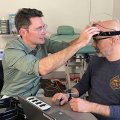
A high-tech building with rooms to mimic environments from rainforests to deserts will help Australian plant scientists and industry improve crop productivity and secure future food supplies.
The University of Queensland’s $65 million Plant Futures Facility is fitted out with technology to finely control temperature, light intensity, light quality, humidity and CO2 concentration, allowing researchers to better predict plant responses to future climates.
UQ Vice-Chancellor Professor Deborah Terry AC said the building - created specifically for plants - was unique in both scale and precision in the southern hemisphere.
“This facility is an important national asset and reinforces the position of Australia, Queensland and UQ as a leader in plant science research,” Professor Terry said.
“Being able to accurately control every aspect of the growing environment opens up opportunities for precision plant science and to fast track experiments”.
Adam Fennessy PSM, Secretary, Department of Agriculture, Fisheries and Forestry, said DAFF works in close partnership with industry and university partners to innovate and maintain international leadership, and research facilities like this were essential.
“Adaptation to climatic changes requires continued investment in research and development, with sustainability credentials in food systems increasingly demanded by governments, investors and consumers globally,” Mr Fennessy said.
“Working with industries, governments and research institutions is important to ensure our policy and program solutions promote productivity growth, secure improved access to international markets and safeguard our animal and plant health status.
“Research facilities, such as The University of Queensland Plant Futures Facility, are critical to be able to do research onshore to deliver these outcomes for Australian agriculture.”
 Construction of the 6-floor Plant Futures Facility started at the St Lucia campus in late 2021 and the first seeds will be brought into the facility this month (October) after a rigorous commissioning period.
Construction of the 6-floor Plant Futures Facility started at the St Lucia campus in late 2021 and the first seeds will be brought into the facility this month (October) after a rigorous commissioning period.
As plants grow in the rooms, cameras and sensors will capture images and data for analysis.
Nine rooftop glasshouses, four for temperate plants and five for tropical plants, help restore some of the capacity lost in the 2022 Brisbane River flood.
Between the 3 floors of grow rooms, glasshouses and laboratories are 2 levels of mechanical and computer equipment.
New opportunities
Director of the UQ-led ARC Centre for Plant Success in Nature and Agriculture, Professor Christine Beveridge, said experiments in the facility will expand knowledge about the relationship between a plant’s genome and the environment.
“We are still discovering fundamental things about how plants work – what makes them flower, branch or have big, small or thick leaves,” Professor Beveridge said.
“We can now expose the same genetic material to slightly different temperatures or to lighting that simulates different day lengths to see how it responds while keeping everything else about the environment the same.
“This level of control was not possible before the construction of this specialised building and the technology it contains.
 “The more we understand the interplay between genetics and the environment, the more we can predict what will happen to plants in a future with climate change,” she said.
“The more we understand the interplay between genetics and the environment, the more we can predict what will happen to plants in a future with climate change,” she said.
Professor Beveridge said the rate of food production per land area needs to increase to feed a 2050 global population of 9.5 billion, and Queensland was poised to support this effort.
“This unique building will advance our knowledge of plant biology and help us speed up the development of crops for particular environments and advice to farmers making choices in the light of weather forecasts.”
The new Plant Futures Facility extends UQ’s involvement in the Australian Plant Phenomics Network.
Media assets
Images, video interview, transcript and B-roll in this Dropbox
Media contact
UQ Communications
communications@uq.edu.au
+61 429 056 139








